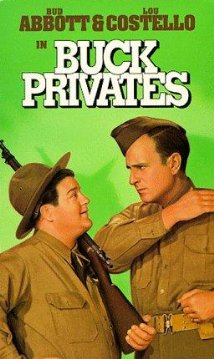
BUCK PRIVATES
US, 1941, 84 minutes, Black and white.
Bud Abbott, Lou Costello, Lee Bowman, Jane Frazee, Alan Curtis, Nat Pendleton, Samuel S.Hinds, The Andrews Sisters.
Directed by Arthur Lubin.
Buck Privates was the second film from Abbott and Costello. They had been very successful in vaudeville and on radio and made their film debut in One Night in the Tropics. They were in supporting roles but had a chance to do what became their usual comic pieces, Bud Abbott is the straightman, Lou Costello is the comic with pratfalls, confusion, with a lot of argument sequences, jokes concerning money…
In this film they are selling ties illegally on the streets, chased by a policeman, Nat Pendleton, and hurry into what seems like a cinema but is really a recruiting station and before they know it they are in the military, with Lou Costello thinking that he could avoid joining up because of his weight, with Abbott making sweat – and his being acceptable, just under the heaviest weight.
Also joining up at the time, with the hope of getting out because of his influential father, is a spendthrift playboy, played by Lee Bowman, and his chauffeur, Alan Curtis, who, as an equal in the army, is not as devoted to his boss as he seemed to be. The film also portrays the women who were supporting the war effort, hostesses for the military, one played by Jane Frazee, the object of attention of both men. She has the opportunity to sing, is a bright and breezy presence – and some in various films, including a number of westerns with Roy Rogers.
Nat Pendleton turns up as the Sgt Major in charge of training. This leads to quite a number of comic situations, the routines for the military and for training, Lou Costello finding it particularly difficult.
There are argument routines once again, jokes about cardplaying, money exchange.
One of the bright features of the film is the presence of The Andrews Sisters who sing quite a number of songs including the Oscar-nominated now-classic, The Boogie Woogie Bugle Boy from Company C, as well as the rousing You’re A Lucky Fellow, Mr Smith as well is the ballad, I’ll Be With You in Apple Blossom Time.
The comedy is sustained, the romance is a slight subplot, and while conscription was in place at this time, and Europe was at war, and Pearl Harbour only months in the future, the film seems something of a propaganda piece for the military without naming the conflicts of the time.
The director is Arthur Lubin, who directed a number of the Abbott and Costello companies comedies as well as those with Donald O’ Connor and Francis, the talking mule.